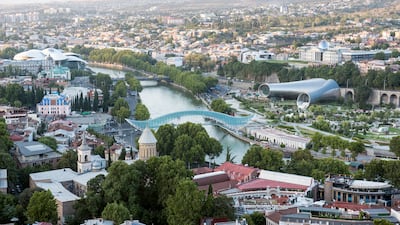The UAE and Georgia have initiated talks to establish a Comprehensive Economic Partnership Agreement (Cepa) to further solidify trade and investment ties between the two countries, the Ministry of Economy said on Thursday.
The partnership will build on the deep and evolving ties between both nations, a statement from the UAE ministry said.
Dr Thani Al Zeyoudi, UAE Minister of State for Foreign Trade, and Natia Turnava, Georgia’s Minister of Economy and Sustainable Development, launched talks to promote the Cepa, the statement added.
“The launch of talks on the UAE-Georgia Cepa reflects our shared desire to work together to enhance the capacity of the private sector, promote start-ups and entrepreneurs, improve market access and substantially increase the volume of two-way trade,” Dr Al Zeyoudi said.
The UAE, the commercial and trading hub of the Middle East, has maintained a strong trade momentum despite pandemic-induced headwinds. The Arab world’s second largest economy has been strengthening its relationship with key trading partners as the global economy recovers and trade rebounds.
The International Monetary Fund expects the global economy to expand 5.9 per cent in 2021 and 4.2 per cent in 2022 after it tipped into a deep recession last year. The volume of world merchandise trade, which slumped 5.3 per cent in 2020, is expected to grow 8 per cent in 2021, according to the World Trade Organisation estimates.
The UAE has already launched free trade negotiations with South Korea, India, Indonesia, Israel and the UK this year.
The Emirates’ non-oil foreign trade with Georgia in the first 10 months of 2021 rose 33 per cent to exceed $165 million, according to the ministry’s statement.
The UAE accounts for more than 60 per cent of Georgia’s trade with Arab countries and more than 40 per cent of its trade is with the Middle East and North Africa, the ministry said.
UAE Minister of State for Foreign Trade
The UAE is also Georgia’s most important source of foreign direct investment from the Arab world and the sixth largest globally, the statement added.
“We want to deepen our existing economic, trade and investment ties to help boost our respective economies and there are huge opportunities for growth in renewable energy, finance, logistics and other key sectors,” Ms Turnava said.
“The UAE is considered a leading centre for trade, energy, business and tourism, and Georgia has wide access to global markets, in addition to its strategic geographical location at the heart of continental trade routes.”
The two countries launched Cepa talks after signing a preliminary agreement on economic co-operation, whereby they agreed to expand association in areas such as transportation and logistics, hospitality and real estate, small and medium-sized enterprises, industry and mining, food security and agriculture, tourism, science, technology, telecommunication and innovation, finance and banking, infrastructure and construction, and environment, according to the statement.
“As part of the UAE’s plans to drive sustainable development over the next 50 years and within the framework of the global economic agreements launched by the government of the UAE under the ‘Projects of the 50’, we look forward to concluding the new trade and investment agreement with our friendly partner Georgia as soon as possible,” Dr Al Zeyoudi said.
Minister of Economy and Sustainable Development, Georgia
The UAE unveiled the first 13 of 50 new projects and initiatives to boost development in September this year. The initiatives will be the cornerstone of growth as the country marks 50 years since unification.
The Gulf country is undertaking comprehensive economic agreements with eight strategic global markets to achieve a Dh40 billion annual increase in the current Dh257bn trade volume with these markets. A Higher Committee for Economic Agreements has also been established.
For instance, the Cepa between the UAE and India aims to boost the value of non-oil trade between the two nations to $100bn in five years.
India and Indonesia are also planning to sign a Cepa in the first quarter of next year, the country’s trade minister Muhammad Lutfi said in an interview last month. The two countries are planning to triple two-way trade in the next four years from $2.5bn in 2020.
Meanwhile, negotiations on the Cepa between the UAE and South Korea are expected to be finalised by the end of 2022. The agreement aims to boost the economic partnership between the two countries to a minimum of $20bn in the next three to five years, up from about $9bn currently, Dr Al Zeyoudi said.


